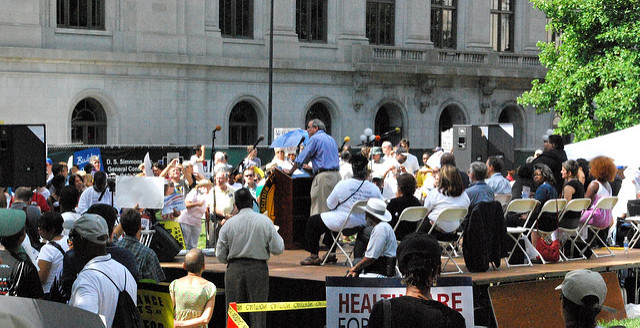A recent paper by Community Catalyst’s Leena Sharma, Carol Regan and Katherine Villers published in the Journal of Aging and Social Policy, looks at the history and future of advocacy by older adults to defend our health care. It finds that we need a more organized and politically powerful base of older adults to defend our health care.
Older adults are known to vote, which helps enormously. But, the authors say that we cannot take for granted their support for health care. To best organize and empower older adults to defend health care, we need to appreciate that they are a very racially and ethnically diverse group. While they strongly support Medicare, Medicaid does not get the same degree of support.
The authors suggest that it is harder to generate support for Medicaid. Older adults are divided along income lines on health care issues. Moreover, Medicaid covers people of all ages, and there are long-held stigmas associated with it. This is concerning, especially as the Affordable Care Act and Medicaid are under serious attack. Older adults with low incomes and from minority groups are at particular risk.
The three biggest organizations that work with older adults are the AARP, the ARA (Alliance for Retired Americans) and the National Committee to Preserve Social Security and Medicare (NCPSSM). The AARP and ARA have a local presence in the vast majority of states, but the NCPSSM has no local presence and focuses on lobbying Congress, in part by activating older adults through direct mail. Working America also organizes around health care issues at the local level.
State level organizations that engage and activate older adults are few and far between. Medicare Rights Center, a national consumer organization, does some organizing work in New York. The Massachusetts Senior Action Council and the New York Statewide Senior Action Council organize older adults in their respective states and work closely with low and moderate income older adults. Organizations such as the Pennsylvania Health Access Network and Take Action Minnesota focus on organizing people across generations, particularly people with low and moderate incomes, to fight for better long-term care in Medicaid.
Faith-based organizations also help to organize older adults around health care. PICO, for example, which represents more than 1100 congregations from 40 denominations, does grassroots organizing on a range of issues, including health care.
The authors recommend that to better organize older adults to defend our health care, we need to appreciate their differences and develop an intergenerational and inclusive strategy and infrastructure. Organizing at the community level is critical, with a national infrastructure coordinating efforts. The authors further suggest that in addition to support for Social Security, Medicare and Medicaid, the organizing efforts should be around age-friendly communities and public services, antipoverty initiatives, support for caregivers and the care workforce.
For the organizing to succeed, the effort will need a bold inclusive vision, strong local and national leadership, significant coalition-building and financial support.
If you support Medicare for all, please let Congress know. Sign this petition.
Here’s more from Just Care:
- Older adults are rising up for financial security: Are you ready for the Silver Revolution?
- Medicaid: Why it matters to all of us
- Accountable Health Communities offer services and supports
- Free local resources to help older adults
- The Freebird Club: A new airbnb just for seniors
- Free and low-cost ways to address hearing loss










